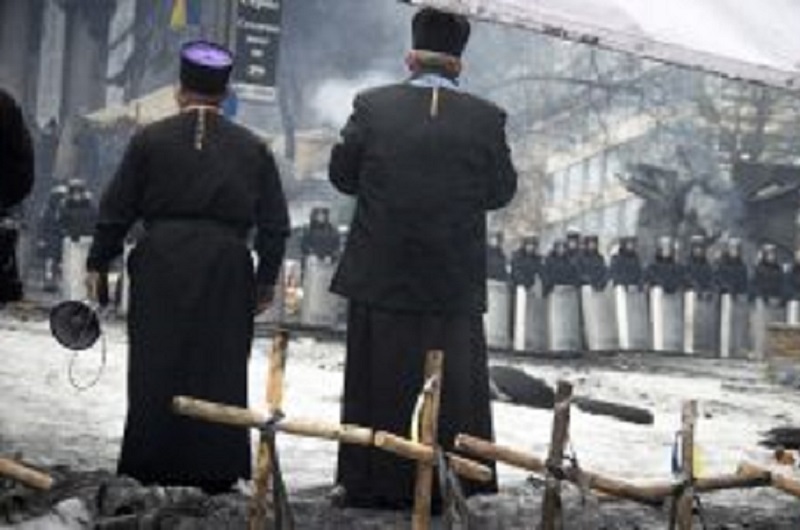
- This event has passed.
WORKSHOP: Orthodoxy and Social Peace
August 29, 2023 - August 30, 2023

Foto: Orthodox priests at the Euromaidan Protests, Kyiv, Ukraine, 2014 © Christiaan Triebert, Attribution 2.0 Generic License (CC BY 2.0)
The online-workshop organised by Regina Elsner brought together international 14 experts from the field of Orthodox theology and Social Ethics in order to evaluate the field: Main questions were: what is already there, what needs to be actualized, what has to be brought forward or researched in a new way? The participants linked theological thinking with the questions of society, social structures and systems and the common good.
Main points discussed were:
Orthodoxy provides a lot of potential resources, however, they are not systematically collected or analyzed, event though participants emphasized liturgy and rituals as a very important resource for coping with conflict, especially for lived everyday religion and everyday life. The very popular idea of “liturgy after liturgy” needs to be developed further for a pluralist world and society, as the homogenic concept has no place for non-Orthodox in society. Also, a new approach to society would demand a de-mystification of the Orthodox understanding of unity, which is often emphasized as Orthodox ideal of social peace, but in reality rituals and myths are often misused and manipulated to construct unity.
A second concept discussed was the strong impact of authority within the church in order to construct social cohesion. Although the question of social cohesion is a question addressed to the lay people, strong vertical power structures limit the social activities of parishes and lay people and their efficacy. Authority, which is a strong part of Orthodox identity, could be analytically differentiated in centralized and decentralized forms as well as spiritual and legal authority. Monasticism is discussed as one aspect in Orthodoxy, which could counter-balance authority. The perspective of female monasticism and of the prophetic voice of monasticism could serve as entry point for analyzing the ideas of social cohesion. However, the notion of “prophetic voice” is highly ambivalent given the fundamentalist claim to prophetic authority and the way it is used to split society instead of bringing people together. It was also underlined that ecumenical relations may support learning how social cohesion is understood in different Christian traditions.
Finally, ideas of dealing with a contested or/and guiltful past in Orthodoxy are challenged with multiple claims to historical truth and justice. Participants underline the task of intellectual honesty, meaning a differentiated and critical approach to what the church teaches and how these decisions were reached and implemented. Therefore, to explore historical cases, which are popular in discussing Orthodox approaches to peace, would be a major task. Such cases could be: holy warriors; the Ukrainian-Polish reconciliation; the Revolution of Dignity; catholic-orthodox conflicts; inner-orthodox conflicts; etc. It should be also analyzed, why the church participated in certain conflict situations, and in others not.
All groups discussed also methodological challenges. Theological methods do exist in some disciplines, in others interdisciplinary or multidisciplinary methods are used. Conceptualizing the project in the frame of an interdisciplinary project in the context of peace- and conflict-studies means to be open for the interdisciplinary methodological discourse. On the other side, the theological input would be important for both self-reflection and the interdisciplinary discourse. Thus, for example a comprehensive biblical approach to the Gospel and the traditional texts about peace and conflict is needed.
